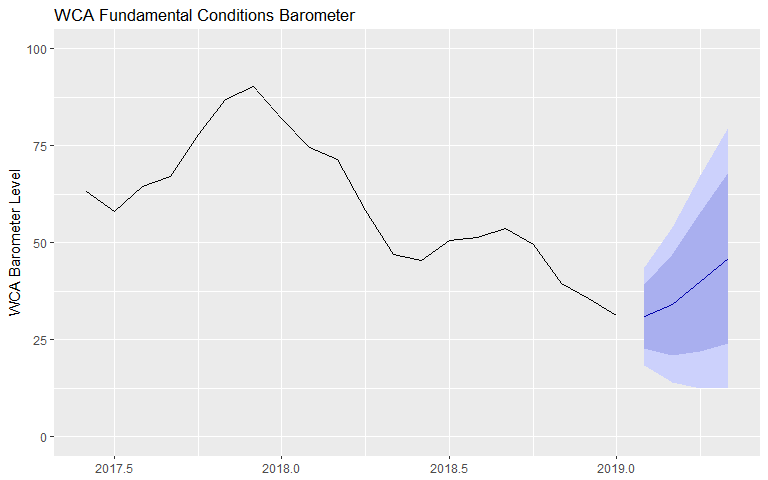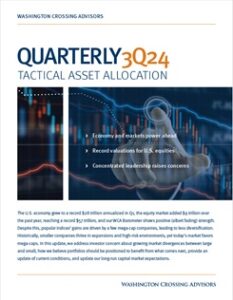Is A Turn in Growth At Hand?
THE WEEK AHEAD
Is A Turn At Hand?
If the U.S. expansion makes it to March, it will match the 1990s expansion as the longest on record. But the last few months have seen a slowing in global growth and a pickup in market volatility.
Even though the current data flow remains mixed, global growth could improve because worries over trade and tightening monetary policy have faded and policy changes suggest stabilization.
Our WCA Fundamental Conditions Barometer (chart, below), which measures broad changes in the growth outlook, improved slightly in the past month, but remains at levels suggesting some continued weakness. Equity exposure in CONQUEST Tactical Asset Allocation portfolios was increased to a modest underweight on account of the recent uptick in our barometer’s forecast path.

The Current Data Flow Remains Mixed
Global economic trends remain weak, especially Europe and parts of Asia. The International Monetary Fund recently lowered its 2019 global growth forecast to 3.5%, below our 3.7% expectation. An leading index of Chinese manufacturing, known as the China Manufacturing Purchasing Managers Index, has been below 50 for three months. European business confidence and output has also slumped in recent months. All-in-all, the global economy appears far less robust than a year ago.
News that the United States will delay an increase in tariffs on Chinese goods, citing “significant progress” on talks, also helps lift some uncertainty. Additional tariffs on $200 billion of Chinese goods had been scheduled to rise to 25% from 10% on March 1st, but President Trump effectively signaled a truce amid what he called “substantial progress” on talks.
The dialing back of two significant market overhangs — central bank tightening and trade — contributed to a better tone for the stock market in January and February. Should risk appetite remain solid, and global policy supportive, it could lead to a second half lift in global growth.
The most important reason global growth could improve is because policy changes support stabilization ahead. Since last summer, the Federal Reserve moved from talking about needing to hike rates further to cool the economy to a need for “patience.” The central bank also announced that they intended to stop unwinding their balance sheet later this year than in the middle of next year, as markets were expecting. This amounts to an about-face by the Federal Reserve and makes it easier for other global central banks to follow suit. The European Central Bank (ECB) has already signaled a willingness to maintain accommodation amidst slower European growth, weakening housing prices, and ongoing Brexit negotiations.
The fact that central banks are moving to ease and global leaders are moving to come together on issues such as trade underscore the slippage in global conditions that began last year. Our WCA Fundamental Conditions Index (graph, below), improved slightly in the last month in anticipation of some improvement ahead. We note, however, that the level remains consistent with a somewhat challenged environment. While we are hopeful that the steps taken in recent weeks gain traction and lead to a pickup later this year, we are mindful that slower business spending and expected profit growth, still weak industrial production, and potential for negative shocks, notably Brexit and China trade negotiations, could impede progress.
Conclusion
So it is clear that although the current data flow remains mixed, global growth could stage a second half comeback for two main reasons. First, worries over trade and tightening monetary policy have faded. But most importantly, policy changes suggest stabilization and support that could foster a turnaround. While not out of the woods yet, some early signs of stabilization are creeping into our outlook and justify a slightly less bearish tactical posture.
When will the global expansion end and will the current one reach a record? It is hard to know for sure, but our analysis of the data leads us to believe we are at an important crossroads.
Kevin Caron, CFA, Senior Portfolio Manager
Chad Morganlander, Senior Portfolio Manager
Matthew Battipaglia, Portfolio Manager
Suzanne Ashley, Analyst
(973) 549-4168
www.washingtoncrossingadvisors.com
www.stifel.com
Disclosures
WCA Fundamental Conditions Barometer Description: We regularly assess changes in fundamental conditions to help guide near-term asset allocation decisions. The analysis incorporates approximately 30 forward-looking indicators in categories ranging from Credit and Capital Markets to U.S. Economic Conditions and Foreign Conditions. From each category of data, we create three diffusion-style sub-indices that measure the trends in the underlying data. Sustained improvement that is spread across a wide variety of observations will produce index readings above 50 (potentially favoring stocks), while readings below 50 would indicate potential deterioration (potentially favoring bonds). The WCA Fundamental Conditions Index combines the three underlying categories into a single summary measure. This measure can be thought of as a “barometer” for changes in fundamental conditions.
The information contained herein has been prepared from sources believed to be reliable but is not guaranteed by us and is not a complete summary or statement of all available data, nor is it considered an offer to buy or sell any securities referred to herein. Opinions expressed are subject to change without notice and do not take into account the particular investment objectives, financial situation, or needs of individual investors. There is no guarantee that the figures or opinions forecasted in this report will be realized or achieved. Employees of Stifel, Nicolaus & Company, Incorporated or its affiliates may, at times, release written or oral commentary, technical analysis, or trading strategies that differ from the opinions expressed within. Past performance is no guarantee of future results. Indices are unmanaged, and you cannot invest directly in an index.
Asset allocation and diversification do not ensure a profit and may not protect against loss. There are special considerations associated with international investing, including the risk of currency fluctuations and political and economic events. Investing in emerging markets may involve greater risk and volatility than investing in more developed countries. Due to their narrow focus, sector-based investments typically exhibit greater volatility. Small company stocks are typically more volatile and carry additional risks, since smaller companies generally are not as well established as larger companies. Property values can fall due to environmental, economic, or other reasons, and changes in interest rates can negatively impact the performance of real estate companies. When investing in bonds, it is important to note that as interest rates rise, bond prices will fall. High-yield bonds have greater credit risk than higher-quality bonds. The risk of loss in trading commodities and futures can be substantial. You should therefore carefully consider whether such trading is suitable for you in light of your financial condition. The high degree of leverage that is often obtainable in commodity trading can work against you as well as for you. The use of leverage can lead to large losses as well as gains.
All investments involve risk, including loss of principal, and there is no guarantee that investment objectives will be met. It is important to review your investment objectives, risk tolerance and liquidity needs before choosing an investment style or manager. Equity investments are subject generally to market, market sector, market liquidity, issuer, and investment style risks, among other factors to varying degrees. Fixed Income investments are subject to market, market liquidity, issuer, investment style, interest rate, credit quality, and call risks, among other factors to varying degrees.
This commentary often expresses opinions about the direction of market, investment sector and other trends. The opinions should not be considered predictions of future results. The information contained in this report is based on sources believed to be reliable, but is not guaranteed and not necessarily complete.
Washington Crossing Advisors LLC is a wholly owned subsidiary and affiliated SEC Registered Investment Adviser of Stifel Financial Corp (NYSE: SF).



